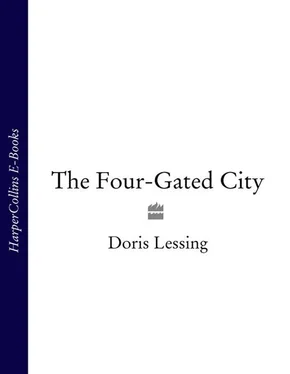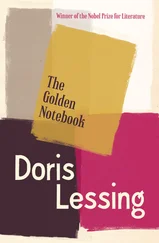At the same time, during the hours while everyone else was still asleep, he was trying to find a subject to write a new novel about – one that he could approve of. ‘I want to write about something real!’ he said, fierce, to Martha. With antagonism: for she was the enemy within the gates who was responsible for the ‘unreal’ book A City in the Desert, the proofs of which he was correcting with such energy. With Martha, the enemy, he discussed possible subjects. He was thinking about a novel which had Mary and Harold Butts as a theme. For he was seeing them as victims of the oppressing Coldridges. But after a week-end with the Butts and his son Francis, he came back saying there was no point in writing about such damned feudalistic rubbish: this was an industrial country. He was spending his mornings at the factory with Jimmy, partly in the talk which was the oil for Jimmy’s inventive genius, but also in considering his employees. He was convinced that he had never considered them before. One morning he saw the foreman and the six workmen who had been with him since the business started, and thanked them for their class solidarity. Jimmy, recounting this tale to Martha, in his smiling way, did so, as she could see, not so much because he wanted to be enlightened, but because he wanted to be reassured. For him, Mark’s new preoccupation was a waste of time; and anyway, Mark’s speech had not been correctly understood: the support given to him by the foreman and the men was not because of his socialist allegiances, but because they liked Mark. Mark saw this – and with regret: feudalism again, he said. He spent hours walking around the streets near the factory, which was in a slummy area in North London. It was not that he hadn’t seen them before; not that he had not recognized the existence of poverty; he hadn’t imagined it, hadn’t felt part of it. He did now, and for a while thought of a novel set in those grim streets. His new friends, however, discouraged him by pointing out that such novels, produced by the hundred in and near the socialist parties, were exactly what that current in the communist movement which they represented, were trying to get away from: the proletarian novel was dead. Mark, in the grip of early conviction when everything was new, argued against them. He even wrote a couple of chapters. The purest logic said he should. The and, and, and; therefore, therefore, therefore; a,b,c,d, of communist logic is always irrefutable because while that particular Person, Personality, absorbs, to shoot out facts, figures, convictions, like a machine, its substance is in fact all emotion. And timeless, or within the bounds, let’s say, of 1917and – but we don’t yet know its end. Half a dozen decades of impassioned socialist polemicizing about Art went for nothing: click, click, click, went the machine, oiled by anger, therefore, therefore, therefore – out comes The Proletarian Novel.
Out came two chapters of Mark’s working-class novel called, Working Hands. Neither the new friends nor Martha had to tell him they were appalling. And, late at night, after the friends had gone, he came to Martha, ready to talk still, to talk until morning if she were ready to stay up. But while he was driven direct from that source of emotional power which is all pure, perfect conviction, Martha was all lethargy. The bad time for her was a slump into exhaustion. She slept too long, she ate too much, she was all heaviness and division: and watched Mark as if she were watching her own young self. And came to realize something she had not before: her memory had gone cloudy. Only ten years ago – and what was ten years? But it was as if her past had become fused with Mark’s present. Almost, or as if Mark was herself, or she Mark. Saying to herself: Yes, I did that, I thought that, I read that book too, I used exactly that vocabulary – she was not able to put herself back there, in that place in herself where she had been; for that place was inhabited by Mark.
In Mark, now, there were at least half a dozen different people, all operating apparently with perfect efficiency, side by side, and not recognizing the existence of the others. For ‘The Defender’ did not, after all, prevent him from talking to the enemy Martha, even taking her advice. It did not prevent him visiting Harold and Mary Butts, where he behaved as he always had: feudally. It did not prevent him talking for hours every day with Jimmy, in the way that Jimmy needed, the humorous, fanciful, creative play which resulted, extraordinarily, in the models of this or that machine which littered Mark’s study. Nor was he less patiently Lynda’s potential or past husband, in cold storage though that person was. Yet neurosis, mental trouble of any kind, was by definition, at that time, in the communist party, reactionary and bourgeois.
And he tried, patiently, clumsily, indeed, pathetically, to be Francis’s father, even while he said to Martha, in language she knew she had used, that the family was doomed.
He tried, too, to be a father to Paul: but Paul would have none of him. The child came home for holidays, and spent his time with Lynda, his friend. Two years of being an orphan had changed Paul into a lively, aggressive, self-contained little boy who was clever at school, but, as the school reports said, ‘made inadequate social relationships’. He certainly had no relationship with Mark; it really was as if Mark did not exist for him. Mark would offer visits to the zoo, walks in the park, a story: Paul did not seem to hear him. Mark said that sometimes he felt as if he were invisible. For it was not rudeness. Paul looked through him, or said to Martha: ‘Can I go down to Lynda now?’
When Paul was at home, the house was open, the door to the basement always ajar. Never when he was not: then the basement became a separate, almost secret establishment.
But Francis was a different matter. His mother was ‘at home’ – and not in a mental hospital, which was helpful at his school, as Lynda had said. But he did not bring his friends home.
The very first holidays after Paul’s mother’s death, Francis came home after a bad time at school. He had changed. Previously silent, serious, watchful, he had suddenly become – something Martha recognized, with pain. He was the clown. In a reaction to what had been brutal teasing, if not worse, his father being a traitor and his uncle under a cloud; accused of being a communist, a red, a commy – he clowned being one. He had joked; adopted, jokingly, communist phrases which he had got out of the papers. Well, there was the mechanism, for Martha to see: yet in herself she could not remember what had created ‘Matty’. ‘Matty’ had joked, claimed exemption by clumsiness, made fun of herself; Francis joked, guyed, bought himself off by a boisterous clownishness. In this condition, he visited his mother and the watchful friend of his mother, in the basement. He was noisy; he racketed about the basement: he badly tired the two sick women.
Then came the time, and very soon, when he returned home to find his father’s friends all communists. They were not figures of fun, but people. His clowning communism stuttered and failed. There were wild scenes of rage, temper, hysteria. It was after that period of holidays that the school reported his work was suddenly very bad, he was at the bottom of the class. Not being a ‘progressive’ school, they said he was lazy and bad-mannered. His father ought to give him a talking to. Mark went to the school to talk to Francis, but the child was locked in a silent hostility, very polite, saying yes Sir, no Sir.
When the time came around again for holidays, Francis said he wanted to spend them with Nanny Butts. Since then, that is where he always went. Mark visited him there, returning to say painfully to Martha: ‘He’s like me – I could never bear coming home either.’
Читать дальше












